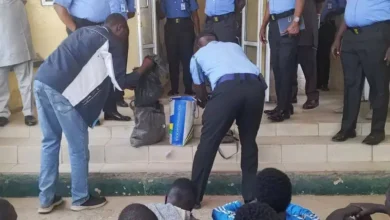LAGOS FLOODING CRISIS: Thousands face homelessness as communities drown in neglect
*A slow tide of suffering worsened by blocked drains, ignored cries, and systemic neglect

By KEMI KASUMU and OUR REPORTER, Lagos
“The unchecked silting, illegal dredging, and reckless disposal of waste into our drainage systems are not accidents; they are the direct result of poor urban governance and systemic neglect. Our people are drowning not because of rain, but because those in power have refused to prioritize human lives over profit and politics,” said Gbadebo Rhodes-Vivour.
It was a haunting Sunday, May 4, 2025, when a video surfaced online — not just any video, but a raw, unfiltered glimpse into the worsening humanitarian crisis unfolding in the heart of Lagos Island. As floodwaters swallowed homes, streets, and dreams, voices of despair rang louder than the thunder of the rain.
Ajoke Balogun, a concerned resident, filmed the footage. Her voice cracked as she narrated scenes of devastation: people using planks, poles, and makeshift bridges to access what used to be roads. In the video, water lapped at doorsteps, and children waded through waist-deep floods to get home. Several, she said, have suffered broken bones navigating the dangerous terrain.
Communities like Jankara, Idumagbo, Onala, Ita-Iduganran, and others appeared more like ghost towns — not because people had left willingly, but because they were forced out by the relentless floodwaters. Homes were no longer shelters, and schools had become swamps. Many children — bright minds with dreams — are now out of school, their futures on hold.
“This is not just a seasonal flood,” Balogun remarked. “This is a betrayal.”
Every year, Lagosians brace themselves for the rainy season — not with umbrellas and raincoats, but with anxiety, fear, and plastic containers to scoop water out of their living rooms. Warnings from the government to vacate flood-prone zones have become routine, yet follow-up action to prevent recurring disasters remains painfully absent.
Across the city — from the elite corridors of Lekki and Victoria Island to the crowded neighborhoods of Ajegunle, Ikotun, and Ikorodu — a shared agony persists. In many areas, residents no longer sleep peacefully. They sleep in shifts, alert to rising water, hoping not to wake up submerged or worse.
This crisis is not only about the rains. It’s about what the rains reveal: drainages clogged with refuse, waterways blocked by illegal structures, silting caused by unchecked dredging, and a system seemingly built to respond only after lives are lost.
During visits to areas like Mile 12 and Ajegunle, traders were openly seen dumping waste into drains. Attempts by journalists to intervene were met with hostility. In other locations, half-hearted construction work lies abandoned, and regulatory agencies are conspicuously silent.
A glaring example occurred when a community member reported a major blockage of water channels to both the Ministry of Environment and the Lagos State Building Control Agency (LASBCA). Rather than act swiftly, both agencies tossed the complaint back and forth. Only divine intervention — a natural collapse of the offending structure — prevented what could have been a tragedy. “Had that structure been completed, lives would have been lost,” the reporter noted, shaken.
There is also the painful silence of traditional rulers, some of whom residents accuse of complicity in the sale of water channels. “They trade away our safety,” said Prince Adefemi Olunaike of Oworonshoki. “We live in fear, but they count their profits.”
Madam Habeebat Kafo from the Island called it “a dance of greed and wickedness,” lamenting how little the government seems to care. “They know people are drowning, but they do nothing — unless it’s to collect taxes.”
Youth leader Atobatele Quadri from Ikotun echoed a similar frustration. “From Ikotun roundabout to the BRT park, it’s always a river after rainfall. Are we invisible to those in power?”
In Ikorodu, repeated complaints to local councils about blocked canals have yielded nothing but bureaucratic hurdles. A community leader summed it up: “They ask for photos, letters, evidence — and still do nothing. We’re tired. We’re grieving. We’re drowning — in water and in hopelessness.”
Behind each flood statistic lies a child whose education has been interrupted, a mother who has no dry place to cook, a father who watches his livelihood washed away, and elders who wonder if they’ll survive the next downpour.
Lagos is not just battling rain — it’s battling a crisis of neglect, poor governance, and systemic indifference. And until those in power see beyond the floodwaters and into the eyes of the people suffering, the city will remain trapped in a cycle of water, warning, and weeping.
“What is happening across Lagos isn’t just flooding — it is the collapse of accountability. We cannot keep blaming nature for what is clearly man-made disaster. The unchecked silting, illegal dredging, and reckless disposal of waste into our drainage systems are not accidents; they are the direct result of poor urban governance and systemic neglect. Our people are drowning not because of rain, but because those in power have refused to prioritize human lives over profit and politics.
“Until we begin to treat environmental planning as a matter of life and death, we will keep mourning preventable tragedies. Communities like Ikorodu, Ajegunle, and Lagos Island deserve more than seasonal warnings — they deserve structural solutions. We must hold both government agencies and private developers accountable, stop the commercialization of our wetlands, and invest in sustainable drainage systems. Our future as a city depends on how we respond to this crisis today,” Gbadebo Rhodes-Vivour, Nigeria’s ace environmentalist and Lagos LP governorship candidate in the 2013 election, said.









